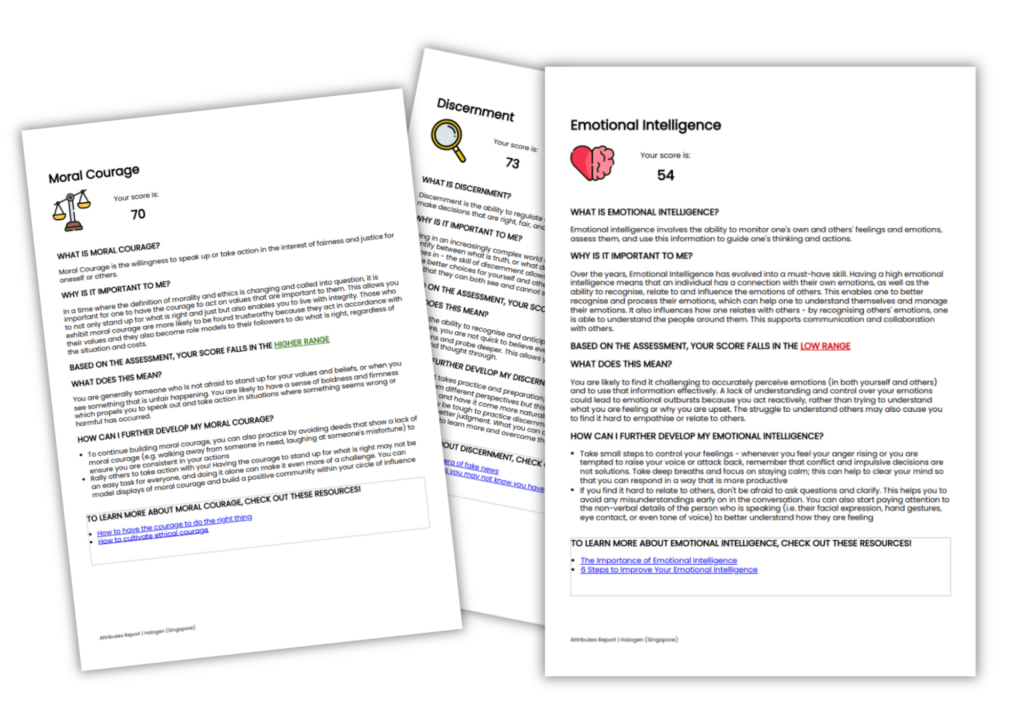Why use quizzes in marketing?
60% of marketers find it difficult to create content that will engage readers, increase time on page, and bring in more shares.
Sounds like something you’re struggling with too?
Quizzes are a great form of interactive content
Interactive content helps you to connect with your audience in a more personalized way. It enables you to interact with them, as the term suggests.
One of the first interactive tools we think of, are quizzes. In a quiz, you ask questions, and your audience replies. You can even take it a step further and give them a score or personalized feedback at the end of the quiz. As such, you have started an interactive conversation with your audience.
From entertainment websites like Buzzfeed to the more “serious” GDPR, all kinds of brands are already seeing the benefits of quizzes.
Quizzes have been used since the beginning of the web but recently they’ve turned into an efficient side-project marketing tactic too. Yet, only 45% of marketers consider their efforts for creating interactive content as being effective.
To see how you can make quizzes work for your content efforts, I reached out to 15 marketers to find out how they made the most out of them.
First, let’s have a look at some of the benefits of using quizzes for your content marketing.
How quizzes improve your content marketing strategy
1. Discover insights for retargeting your audience

Dana Flannery, Director and SEO Specialist, TAC Digital
“A massive issue in content marketing is that people come to your site, read the content and then leave again, they don’t spend too long on the page (which in turn affects your bounce rate, time on page, etc.) The first benefit to using quizzes is that they drastically increase user engagement. They spend longer on the page and they are more likely to click through to other content, especially when you suggest content related to their answer/result. The reason we started using quizzes in content marketing, is that you can gain massive insights into your audience and then use this to target them further in the future. We had a client that sold clothes and accessories. We set up a quiz so users could “find their ideal style” and placed it on the homepage. When new users came to the site, they would take the quiz. From there we were able to give them recommendations based on their answers. We also captured their email addresses and would send them emails targeting their preferences. We have seen significant increases in sales and direct purchases from quiz results and targeted emails."
2. Gain email sign-ups

Stacy Caprio, Founder, Growth Marketing
“You can leverage quizzes to gain email sign-ups. One way to do this is to send the quiz results to an email address. This makes the user more likely to give you their actual email so they can view their quiz results."
3. Increase user engagement

Samuel Adams, Social Media and Content Strategist, SeedSpark
“Quizzes drive engagement. In a world where BuzzFeed quizzes have become a pastime, leveraging the desire of people to get involved provides an invaluable way to kick off a conversation with your digital audience. These quizzes not only get people involved with your content, but they shape a message around your company – what your industry is, what your company provides, and what your team does that sets it apart from the competition. A high-performing quiz should be a blend of lighthearted and informative. The goal isn’t to make someone feel like they’re taking a test, but rather that they’re playing a game to pass the time.”
4. Provide value for your customers

Stacey Kehoe, Founder, Brandlective
"We began using quizzes as a way of understanding our customers. Over the past 18 months that has evolved into creating a value-add lead magnet for our agency. Our Digital Marketing Scorecard benchmarks participants on the 6 most essential areas of marketing, compared to industry averages and producing a personalized report at the end that the participant can begin implementing on their own. It has been ground-breaking for our brand by raising our profile and putting our services on the radar of our prospects. It is high-value for the participants but also very valuable for us. Both for tailoring our communications to the participant depending on how they scored in the quiz and also developing our insights into the common challenges our ideal prospects are facing.”
5. Connect with your audience in a fun way

Darin Evangelista, Director of Content, ChatterSource
“The largest benefit of using quizzes for content marketing is that it’s a great way to capture more data about your website visitors. Many traditional lead-capture methods are boring and only record one data point: an email address. But with quizzes, you can interact with your visitors in a fun and non-intrusive way while learning more about their interests and needs. When used correctly, quizzes are perfect for capturing data that can be used to create a personalized email drip campaign to maintain contact with the potential customer and turn them into a returning customer.”
6. Increase your conversion rate

Mark Zalewski, Partner, Head of Marketing, Fathercraft
“Engagement, all day. People LOVE interacting with quizzes, it is fun, engaging, and informative if done correctly. Quizzes outperform bounce rates for blog posts, as well as video engagement metrics. A second, huge benefit is segmentation. We’re trying to determine who a person is — are you the one who is pregnant? The father? The grandparent? A sibling or friend? That 90-second quiz gives me all that information (and way more). As a marketer I want to speak to all of those people differently… which in turn increases conversion rates on the back end.”
7. Entertain your reader with gamification

Melissa Hollis Goff, Editorial Director, Think Save Retire
“Of the many benefits to using quizzes in your content strategy, here are my top 4:* 4. Understand Your Users/Readers Quizzes give you user-generated insights into how your audience thinks or handles the topics that are relevant to your product or offer. You can—and should—use them as their own form of market research. Most often, you can also turn those insights into user-generated content and re-engage with test-takers with collective results so they can see how they measure up. 3. Content Delivery While you can use questions in a quiz to understand your audience, you can also use them to tell a story that might otherwise get overlooked if it was in traditional article or guide form, for example. As much as it might feel personal to the quiz-taker, you can also make it about yourself, your product, or your brand and leave a lasting impression. 2. Value Exchange and Immediate Gratification Let’s call quizzes what they are – lead gen forms with a twist. Any form is about exchanging information for something of value. While a compelling guide, eBook, or whitepaper can get someone to complete a basic form, a quiz promises quick and personalized answers to their burning questions. 1. Gamification If you want to get someone to do something – make it fun! While we all dreaded pop quizzes in high school biology class, a quiz on a topic that we set out to understand, and are probably not being graded for, is more game-like. People love to be entertained and they also like to feel like they accomplished something – like a level in a video game. This is what makes quizzes a powerful way to get your audience to enjoy consuming your content – and might want to engage with you again.”
8. Personalize your customer follow-up

Daniel Dawson, Demand Generation Manager (Marketplace), Aircall.io
“The benefit of using quizzes was that our audience (eCommerce customer support personas) were able to self-grade their own team’s readiness for eCommerce holiday customer support. When a person completed a quiz after entering their name, email etc., they received a personalized answer and follow up nurture. This positioned Aircall as an authority and, I think, one step above in terms of creativity, as opposed to other typical content and offers out there for the same audience. Our quiz also did well for lead generation.”
9. Understand how your customers perceive themselves

Clay Ostrom, Founder, Brand Strategist, Map & Fire
“From a brand and marketing strategy perspective, we’re always looking for ways to better understand the motivations and perceptions of customers. What makes the quiz format special is that it gives you insight into how customers view themselves. When you want to make an emotional connection with someone, knowing how that person self-identifies allows you to speak directly to their most important needs. We’ve used quizzes with our own audience to see how they view their business challenges. The format gives us a chance to engage with customers in a way that provides value to them and us. Definitely win-win.”
10. Spark conversations on social media

Rachel Ford, President and Co-Founder, Ford Media Lab
“As a content marketing agency, everything we do is to add value. Quizzes are a great way to do this, providing a fun, informative distraction for our clients while also demonstrating the type of content we could create for them and their brands. We began adding quizzes to our content marketing strategy when we noticed that customers and consumers responded favorably to polls and similar calls to action on social media. Many of our clients are particularly invested in capturing conversation shares, and the most effective way to generate conversation is to give people something they feel compelled to participate in – and in turn, talk about.”
11. Solidify the take-away from your content

Linda Formichelli, Founder & Creative Director, Hero’s Journey Content
“We use quizzes to add interest to a piece of content, solidify the take-home value for the reader, and boost social shares. Readers love to share their score! As a former women’s magazine journalist who’s written a lot of quizzes, I learned that the trick is to make sure your answers are not too easy to guess. No one wants to go through checking B, B, B, and already knowing what the results will be at the end. So be sure to have some tricky questions in there. Also, include fun questions that make for good sharing later. For example, you might be able to share that 10% of credit union members believe ‘the dab’ is a method of identity theft. Finally, don’t just have an answer key at the end. Explain the correct answers so the reader learns something useful.”
12. Answer your reader’s need

Adam Hempenstall, CEO and Founder, Better Proposals
“We have quizzes with titles like How much more business can you win by automating your proposals? and How much more can you earn as a freelancer when you use automation?. They entice people to click and take the quiz. The first element of a great quiz is a title that answers the individual’s need – to find out something about themselves or solve their problem, such as earning more money. The second element is having the optimal number of questions, from 8 to 10. Third, the questions should have 3-4 choices each, and each choice should be tied to a certain outcome. Finally, the quiz taker can only get the results if they leave their email, which is the most precious asset you can get.”
13. Fine-tune your customer segmentation

Olga Mykhoparkina, Chief Marketing Officer, Chanty
"We use quizzes to learn more about our visitors (and users) so that we can segment them better. Once they go through a quiz and answer all the questions, we know what kind of a customer they are, what their needs are and how we can better resolve them. Based on the audience segment that we put them in, they get different marketing materials to their email. The key to a high-performing quiz is having great quiz results that can segment your audience so that everyone wins in the end. For example, we have business owners with 100+ employees who want to replace Slack with Chanty, all in a specific segment, thanks to the quiz results we get.”
14. Entice your readers to return

Sean Clancy, SEO director/CMO, Edge Marketing
“Quizzes add a bit of variety to content and encourage interaction from your readers. Leaving them with a positive impression and enticing them to return. If you are an educational or informational site, as some of our clients, a quiz is a fantastic way of measuring their knowledge, you can then relay feedback to them so they are aware of what areas they need to brush up on. This can encourage further page views on your website, as they will use those information pages as a resource to brush up on their knowledge. If you display their results compared to their peers, it can and will encourage competition. Most people have a competitive edge to them, and this will have an added benefit on our site, especially if you include a share option – so they can easily invite their friends to challenge them.”
15. Strengthen your SEO

Olivia Blazevic, Content Marketing Manager, Candlefox
“For us, creating rich quizzes as part of our content marketing strategy allows us to provide value in many areas. If formatted correctly, a quiz can help to collect user data such as customer emails and help to grow email marketing databases.
Quizzes are also great for SEO – by including a visually appealing, fast loading quiz, you are encouraging several page interactions (users clicking through and answering each question), along with a low bounce rate and a longer page dwell time (all favored highly in the eyes of Google). Then, if your quiz redirects to a results page, you are increasing the page depth of your user’s journey.
By utilising the Pointerpro platform to create our Career Quiz, in a few months we’ve been able to pull an estimated 2K monthly traffic and average position 3 in the SERPs for massive keywords.
When executed correctly, a quiz can be a multi-faceted, creative asset that is your secret weapon to content marketing.”
BONUS: Tailor to every stage of the buyer’s journey

Artem Minaev, Firstsiteguide.com
“We found that using quizzes is not only a great lead generation strategy but also a super-effective way to segment your audience. For instance, we ran a quiz to help us segment our users based on how experienced they are in various digital marketing disciplines. The aim of this quiz was to identify what part of our audience was just starting out their journey in the digital marketing world, and what part was quite experienced. Once a user went through the quiz, we automatically sent the user to the matching email marketing funnel. Thanks to the quiz, we’ve been able to increase the engagement rate of our whole audience dramatically. The best thing about quizzes is that they allow you to nurture your subscribers in a fun and engaging way. While B2B can be a dull niche, quizzes definitely spice up your content marketing strategy and help you create a loyal community around your brand. Here’s a great example of a quiz created by SEMrush and tests for how good you are at content marketing.”
How to use quizzes for marketing
Now it’s your turn to create a quiz for your marketing strategy. Let’s take it step by step:
- Start by creating a goal for using quizzes in your content. Do you want to create top of funnel content? Do you want to grow your email list? Need more leads? Or maybe you just want the shares to bring in new traffic.
- Then, decide the type of quiz you’ll go for. Personality quizzes, matching quizzes, or knowledge tests are among the most popular options. A quick note here: You can also use your quizzes as surveys so you’ll both entertain quiz takers and gather data for a study.
- At this point, you can also think of an eye-catching headline. 59% of people will actually share content based on its title alone without even reading it. You only need this data to realize how important that H1 of your quiz will be.
- Put down all your ideas in Google Docs and then turn them into a ready-to-use quiz via a tool like Pointerpro that lets you customize your questions according to your own needs and get the results on a visual dashboard, ready to be downloaded and shared.
- Add in a timer or leaderboard for extra engagement. Creating a sense of competition will get people to retake the quiz until they get a better score to share with their peers.
Take your quizzes to the next level with Pointerpro
Pointerpro’s quiz software provides an ideal environment to upload your questions and add custom scoring. Give a score and personalized feedback automatically by adding customized recommendations in the interface. It will seem as if you are directly speaking to the respondent, who will receive valuable feedback about your product, service or training.
You can even White Label your quiz design to fit your own brand seamlessly!
Pointerpro has helped Olivia Blazevic (CandleFox) increase traffic and SERP significantly: “By utilising the Pointerpro platform to create our Career Quiz, in a few months we’ve been able to pull an estimated 2K monthly traffic and average position 3 in the SERPs for massive keywords.”
Inspiration for your questions
Use these quiz question examples you can tailor to your business targets. Take a look at what competing quizzes look like but bring in your own touch to differentiate your quiz marketing techniques. Especially if you want to keep doing this in the long run.
Anything from using multiple choice questions to image choice- or open-ended questions to customizing the end messages will work.
Back to you now.
What are you doing to keep the content you create interactive? Tried quizzes yet? Let us know in the comments below.





